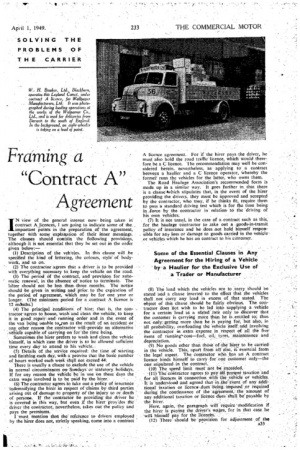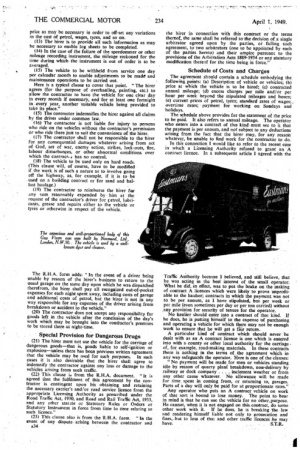I N view of the general interest now being taken in
Page 23

Page 24

If you've noticed an error in this article please click here to report it so we can fix it.
contract klicences, 1. am going to indicate some of the important points in the preparation, of the agreement, together With some explanation of their inner meanings. The clauses should contain the following provisions, although it is not essential that they be set out in the order given below:—
(1) Description of the veheles. In this clause will be specified the kind of lettering, the colours, style of bodywork, and so on.
.• (2) The contractor agrees that a driver is to be provided with everything necessary to keep the vehicle on the road.
(3) The period of the contract, and provision for auto
` rnatic renewal, in the absence of notice to terminate. The later should not be less than. three months. The notice should be given in writing and plibr to the expiration of the period of agreement, which may be for one year or longer. (The minimum period for a ,contract A licence is••
12 meInths.)
(4) The principal conditions of hire; that is, the contractoragrees to house, wash and clean the-vehicle, to keep it in good repair .and running order and in the event of the van being unable to,runi as the result of an accident or any other reason the contractor will provide an alternative . ,vehicle capable of carrying on forthe time being.
Sometimes the hirer prefers to wash and clean the vehicle himself, in which case the driver is to be allowed sufficient time every day to attend to his vehicle_ .
(5) Details of the service required: the time of starting. and finishing each day, with a proviso that the basic number ' of hours worked each week shall not exceed 44.
• There is usually a clause to exclude the use of the vehicle in normal circumstances onSundays or statutory holidays. If for any reason the vehicle. be in use on these days the extra wage involved is to be paid by the, hirer., (6) The contractor agrees to take out a policy of insurance indemnifying the hirer in respect of claims by third parties arising ont of damage to property of the injury to or death of persons. If the contractor be providing the driver be ' is covered in this way, but even if the hirer prov-des the driver the contractor, nevertheless, takes out the policy and pays the premiums.
I must mention that the reference to drivers employed by the hirer does not, strictly speaking, come into a contract
(8) The load which the vehicles are to carry should be stated and a clause inserted to the effect that the vehicles shall not Carry any load in excess of that stated. The object of this clause should be fairly obvious. The contractor does hot wish to be led into supplying a vehicle for a certain load at a stated rafe only to discover that the customer is carrying more than he is entitled to thus not only getting more than he is paying for but also in all ,probability; overloading the vehicle itself. and involving the contractor in _extra expense in respect of all the five items of running■bast—fuel, Oil; tyres, maintenance and depreciation.
(9)• No goods other than thOse of-the hirer to be carriedin the Vehicle. This apart from all else; ic essential from the legal aspect. The contractor who has an A contract licence binds himself to carry -for" one customer only—the one stipulated in the contract.. -•(10) The speed limit must not (.4 exceeded. '(11) The contractor agrees to Pay all present taxation and for all licences in connection with the vehicle or vehitles. ' It is understood and agreed that in the event of any additional taxation or licence-dues .being, imposed or required during the continuance of the agreement, the 'amount of any additional taxation or licence cfues shall be' payable by
the hirer. '
Here, again, the paragraph Will require modification if the hirer is paying the driver's wages, for in that case he himselfpay for the licences: .•
(12) There should be provision fOr adjustment of the price as may be necessary in order to off-set any variations in the cost of petrol, wages, tyres, and so on.
(13) The hirer is to provide an such information as may be necessary to enable log sheets to be completed.
(14) In the case of the failure of the speedometer or other mileage recording instrument, the mileage reckoned for the time during which the instrument is out of order is to be averaged.
(15) The vehicle to be withheld from service one day per calendar month to enable adjustments to be made and maintenance operations to be carried out.
Here is a typical clause to cover that point. "The hirer agrees (for the purpose of overhauling, painting, etc.) to allow the contractor to have the vehicle for one clear day in every month if necessary, and for at least one fortnight in every year, another suitable vehicle being provided to take its place."
(15) The contractor indemnifies the hirer against all claims by the drives under common law.
(16) The contractor is not liable for injury to persons who ride on the vehicles without the contractor's permission or who ride there just to suit the convenience of the hirer.
(17) The contractor shall not be responsible to the hirer for any consequential damages whatever arising from act of God, act of war, enemy action, strikes, lock-outs, fire, labour disturbances, or other abnormal conditions over which the contract, .s has no control.
(18) The vehicle to be used only on hard roads. (This clause will, of course, have to be modified if the work is of such a nature as to involve going off the highway, as, for example, if it is to be used on a building contract or for sand and ballast haulage.)
(19) The contractor to reimburse the hirer firany sum reasonably expended by him at the request of the contractor's driver for retro', lubricants, grease• and repairs either to the vehicle or tyres or otherwise in respect of the vehicle.
The R.H.A. form adds: "In the event of a driver being unable by reason of the hirer's business to return to the usual garage on the same day upon which he was dispatched therefrom, the hirer shall pay all recognized out-of-pocket expenses for each night spent away, including costs of garage and additional costs of petrol, but the hirer is not in any way responsible for any expenses of the driver arising from breakdown or accident to the vehicle."
(20) The contractor does not accept any responsibility for goods left in the vehicle after the conclusion of the day's work which may he brought into the contractor's premises to be stored there at night-time.
Special Provision for Dangero,us Drugs
(21) The hirer must not use the vehicle for the carriage of dangerous goods—that is, goods liable to self-ignition or explosion—unless there has been previous written agreement that the vehicle may be used for such purposes. In such cases it is also desirable that the hirer shall agree to indemnify the contractor against any loss or damage to the vehicles arising from such traffic.
(22) This clause i from the R.H.A. document. "It is agreed that the fulfilment of this agreement by the contractor is contingent upon his obtaining and retaining the necessary carrier's and/or road service licence from the appropriate Licensing Authority as prescribed under the Road Traffic Act, 1930, and Road and Rail Traffic Act, 1933, and any other statate or Statutory Rules or Orders or Statutory Instrument in force from time to time relating to such licence."
(23) This clause also is from the R.H.A. form. "In the event of any dispute. arising between the contractor and A34
the hirer in connection with this contract or the terms thereof, the same shall be referred to the decision of ,asingle arbitrator agreed upon by the parties, or failing such agreement, to two arbitrators (one to be appointed by each of the parties hereto) and their umpire pursuant to the provisions of the Arbitration Acts 1889-1934 or any statutory modification thereof for the time being in force."
Schedule of Costsand Charges The agreement should contain a schedule embodying the following points: (a) Description of vehicle or vehicles; (b) price at Whichthe vehicle is to be hired; (c) contracted annual mileage; (4) excess charges per mile and/or per hour per week beyond the stipulated mileages and hours; (e) current prices of petrol, tyres; standard rates of wages; _ overtime rates; payment for working on Sundays and holidays.
The schedule above provides for the statement of the price to he paid. It also refers to annual mileage. The operator who enters into a contract of this kind must see to it that the payment is per annum, and not subject to any deductions arising from the fact that the hirer may, for any reason whatever, be unable to find work for the contractor to do.
In this connection I would like to refer to the recent case in which a Licensing Authority refused to grant an -A contract licence. In a subsequent article I. agreed with the
Traffic Authority because I believed, and still believe, that he was acting in the best interest of the small operator. What he did, in effect, was to put the brake on the making of contract A licences which were likely to prove unprofitable to the haulier; contracts in which the payment was not to be per annum, as I have stipulated, but per week or per mile (even sometimes per day or per ton carried) without any provision for security of tenure for the operator.
No haulier should enter into a contract of that kind. If he does, he is putting himself to the expense -of purchasing and operating a vehicle for which there may not be enough work to ensure that he will get a fair return.
A particular kind of contract which should never be dealt with as an A contract licence is one which is entered into with a county or other local authority for the carriage. of, for example, road-making materials. In these contracts there is nothing in the terms of the agreement which in any way safeguards the operator. Here is one of the clauses: "No payment will be made for men or vehicles standing idle by reason of quarry plant breakdown, non-delivery by railway or dock company . . inclement weather or from any other cause whatever. No allowance will, be made for time, spent in coming from, or returning to, garages. Parts of a day will only be paid for at proportionate rates."
Any operator who puts an A contractvehicle on work of that sort is bound to lose money. The point to bear in mind is that he can use the vehicle for no other..purpose. He cannot, when it is not engaged on this. contract, do some other work with it. If he does, he is breaking the law and rendering himself liable not only to prosecution and fines, .but to loss of that and other traffic licences .he may have. .


























